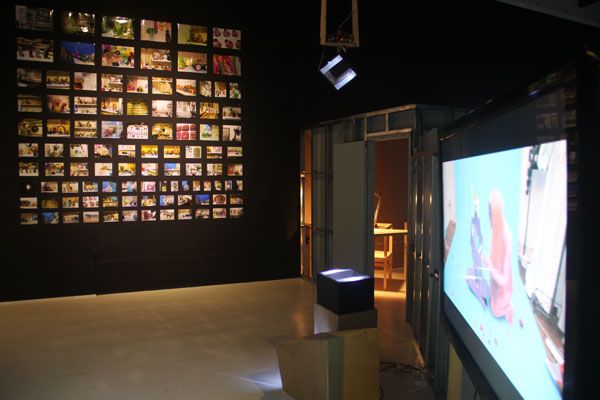一间不属于自己的房间 | A Room Not of One’s Own
策展人 | Curator: 付晓东 | Fu Xiaodong
艺术家 | Artist:
陈昕鹏、董大为,窦卜、范西、高洁、何迟、贾淳、老木、厉槟源、梁半、梁硕、林科、栾雪雁、史金淞、孙少坤、王卫、辛云鹏、杨光南、杨健、杨心广、叶甫纳、赵赵 | Chen Xinpeng, Dong Dawei, Dou Bu, Fan Xi, Gao Jie, He Chi, Jia Chun, Lao Mu, Li Binyuan, Liang Ban, Liang Shuo, Lin Ke, Luan Xueyan, Shi Jinsong, Sun Shaokun, Wang Wei, Xin Yunpeng, Yang Guangnan, Yang Jian, Yang Xinguang, Ye Funa, Zhao Zhao
开幕 | Opening : 2014/6/21 16 : 00 PM
展览日期 | Exhibiting Time : 2014/6/21—2014/7/13
地点 | Venue : 空间站 北京市朝阳区酒仙桥路4号798艺术区中一街 Space Station,NO.4 Jiuxianqiao Rd,798 Art District,Beijing 100015
T : +86 10 59789671
W : www.space-station-art.com E : spacestationart@163.com
一间不属于自己的房间
空间站将于2014年6月21日至7月13日举办由付晓东策划的22位艺术家参加的名为“一间不属于自己的房间”的空间实验性展览。旨在尝试私人空间的政治权力批判和个体日常生活改造。此项目空间站与《鲤》杂志共同合作的跨界艺术项目,由JNBY赞助。参展艺术家包括:陈昕鹏、董大为、窦卜、范西、高洁、何迟、贾淳、老木、厉槟源、梁半、梁硕、林科、栾雪雁、史金淞、孙少坤、王卫、辛云鹏、杨光南、杨健、杨心广、叶甫纳、赵赵。展览作品全部由艺术家针对私人生活空间工作室来进行思考和实施,展厅中呈现的是改造私人空间的过程和结果。
同期由张悦然主编、多位作家参与的《鲤》杂志也将推出同名主题书,以文学的形式与展览呼应。30本与读者共同完成的杂志也将展出。届时,策展人和主编将邀请参展艺术家和参与出版的文学家,在空间站开幕时进行一场对展览主题跨越文学与艺术的交锋与对话。会有怎样的碰撞产生?欢迎大家参与围观。
在城市化进程中,都市的空间固化为空间模型,生活空间和工作空间成为房地产产品,生活方式也被消费性广告和主流政治规格化,空间的使用方式也在被严格的控制化和规格化。空间的功能、空间之间的结构关系、空间系统的建立,全部为了适应典型的权力机制。日常生活的程式被权力结构分配,规训,直接构造。在城市主流的生活空间中,人与空间关系被规定,生活方式的固化导致身体的固化,不被察觉的隐性控制成为了的无法逃脱的权力结构。在这种空间政治下,艺术家如何审视自己的私人空间?他们的抵抗与背叛,合作与游离,显得尤其重要。
工作室对于艺术家来说就不仅仅是一个无机的生产材料,而是混合了政治、生活、实验,成为了一个探讨时间和观念的场域,是一个不断发展、叛逃的表达性的空间。布鲁斯瑙曼指出,“如果我是艺术家,我在工作室里工作,那么我在工作室里做的任何事都是艺术。在这点上,艺术更多的是一个活动而不是产品。”工作室既是一个资料储存的图书馆,又是一个生产灵感的游戏场。有一些艺术家工作的方法和理念,与空间发生这某种对应性的关系,工作室也成为作品最有效和直接的物理语境。同时,工作室作为一个艺术家的生产空间和生活空间,艺术作品的生产过程具有难以为人所见的日常性和私人性。
A Room of One’s Own
An experimental exhibition A Room Not of One’ s Own is to be held by Space Station from June 21st to July 13th, 2014. The exhibition, organized by Fu Xiaodong, includes 22 artists’works and aims to criticize the political rights of private space and to transform individual’s daily life. The Space Station and Carp Magazine cooperate to bring out this interdisciplinary art project, sponsored by JNBY. Participants include: Chen Xinpeng, Dong Dawei, Dou Bu, Fan Xi, Gao Jie, He Chi, Jia Chun, Lao Mu, Li Binyuan, Liang Ban, Liang Shuo, Lin Ke, Luan Xueyan, Shi Jinsong, Sun Shaokun, Wang Wei, Xin Yunpeng, Yang Guangnan, Yang Jian, Yang Xinguang, Ye Funa, and Zhao Zhao. The exhibiting works show how the artists think and implement towards the studio, the private living space; they are the process and result of the transformation of private space.
In the meantime, the Carp magazine edited by Zhang Yueran and many other writers is going to put forward a theme book on the same name, echoing the exhibition with literature. 30 copies finished with the readers are also going to be presented. On the occasion, the organizer and the chief editor will invite a dialogue of literature and art between the participating artists and litterateurs on the opening ceremony. What will happen then? Your participation is most welcome.
In the process of urbanization, the space in city is rigidified into spatial models: living and working space have turned into commodities of real estate; people’s lifestyle is regularized by commercials and mainstream politics; the way of using space is under strict control and regulation. The function of space, the structural relations between spaces and the establishment of spatial system are all for the purpose of accommodating themselves to the typical power scheme. The formula of daily life is distributed, disciplined and directly shaped by power structure. Within the mainstream living space of the city, the relation between man and space is stipulated, and this rigid living style further leads to the rigidity of body: a kind of invisible control that forms unperceived has become an inescapable power structure. How the artists think of their own private space under such spatial politics? Their resistance and rebellion, cooperation and disassociation are under serious consideration.
For the artists, the studio is not only an inorganic productive material, but a mixture of politics, life and experiment, forming a field that studies time and notion, an expressive space that is ever developing and rebelling. Bruce Nauman says “If I am an artist, and I work in my studio, then everything done there is art.” Judging from this, art is more of an activity than a product. The studio is both a library for data storage, and a playground for producing inspiration. Some artists’ methods and notions of working have intertwined with the space, making the studio the most effective and immediate physical context of the work. In the meantime, that the studio being the manufacturing and living space of an artist has endowed the production of artistic work with a hard-to-be-seen sense of daily life and privacy.
空间站 | Space Station
T: +86 10 59789671
W: www.space-station-art.com
E:spacestationart@163.com info@space-station-art.com
地点:空间站 北京市朝阳区酒仙桥路4号798艺术区中一街
Venue: Space Station,NO.4 Jiuxianqiao Rd,798 Art District,Beijing 100015


